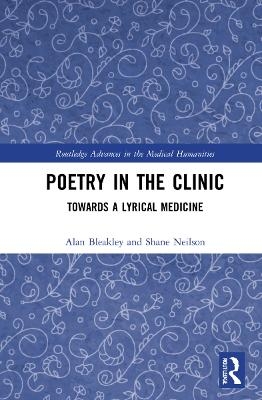
Poetry in the Clinic
Routledge (Verlag)
978-1-032-04724-9 (ISBN)
This book explores previously unexamined overlaps between the poetic imagination and the medical mind. It shows how appreciation of poetry can help us to engage with medicine in more intense ways based on ‘de-familiarising’ old habits and bringing poetic forms of ‘close reading’ to the clinic.
Bleakley and Neilson carry out an extensive critical examination of the well-established practices of narrative medicine to show that non-narrative, lyrical poetry does different kind of work, previously unexamined, such as place eclipsing time. They articulate a groundbreaking ‘lyrical medicine’ that promotes aesthetic, ethical and political practices as well as noting the often-concealed metaphor cache of biomedicine. Demonstrating that ambiguity is a key resource in both poetry and medicine, the authors anatomise poetic and medical practices as forms of extended and situated cognition, grounded in close readings of singular contexts. They illustrate structural correspondences between poetic diction and clinical thinking, such as use of sound and metaphor.
This provocative examination of the meaningful overlap between poetic and clinical work is an essential read for researchers and practitioners interested in extending the reach of medical and health humanities, narrative medicine, medical education and English literature.
Alan Bleakley is Life Emeritus Professor of Medical Education and Medical Humanities at Plymouth Peninsula School of Medicine, UK. He is a widely published poet, psychologist, and psychotherapist, and has written many academic books, most recently Medical Education, Politics and Social Justice: The Contradiction Cure (Routledge 2021). Shane Neilson is a poet and medical doctor who practices in Guelph, Ontario, Canada. He has written several books of poetry and poetry criticism. In 2022, he will publish You May Not Take the Sad and Angry Consolations and Saving.
Part I: Setting Out to Alter the Narrative. 1.In difference (and not deference) to narrative medicine. 2.The imperialism of narrative. 3.What’s the story behind Narrative Medicine? The shared epistemologies of Narrative Medicine and biomedicine. 4.Is narrative medicine just another story biomedicine tells before we go to sleep? 5.What can Russian Formalism do for us lately? & other unapplications. Part II: Theorising Lyrical Medicine 6.Re-visioning diagnostic reasoning, or stepping out from the skull. 7.Out from the skull and into the world. 8.Celebrating lyric poetry, beauty and medical moods. 9.Poeticising with a medical imagination: what medicine can do for poetry. 10.Diagnosing with the poetic imagination: what poetry can do for medicine. 11.Kinds of ambiguity in clinical work. 12.General Change and The Poetry Uselessness Red Book. 13.Tactical ambiguity spelunking amidst Canadian physician-poets. 14.Practitioner-Poets do the Footwork.
| Erscheinungsdatum | 04.01.2022 |
|---|---|
| Reihe/Serie | Routledge Advances in the Medical Humanities |
| Zusatzinfo | 2 Line drawings, black and white; 1 Halftones, black and white; 3 Illustrations, black and white |
| Verlagsort | London |
| Sprache | englisch |
| Maße | 156 x 234 mm |
| Gewicht | 700 g |
| Themenwelt | Literatur ► Lyrik / Dramatik ► Lyrik / Gedichte |
| Sachbuch/Ratgeber ► Gesundheit / Leben / Psychologie | |
| Geisteswissenschaften ► Sprach- / Literaturwissenschaft ► Anglistik / Amerikanistik | |
| Geisteswissenschaften ► Sprach- / Literaturwissenschaft ► Literaturwissenschaft | |
| Studium ► 1. Studienabschnitt (Vorklinik) ► Med. Psychologie / Soziologie | |
| Sozialwissenschaften | |
| ISBN-10 | 1-032-04724-0 / 1032047240 |
| ISBN-13 | 978-1-032-04724-9 / 9781032047249 |
| Zustand | Neuware |
| Informationen gemäß Produktsicherheitsverordnung (GPSR) | |
| Haben Sie eine Frage zum Produkt? |
aus dem Bereich


